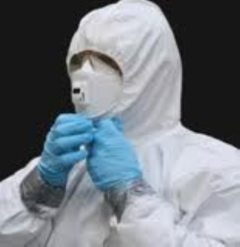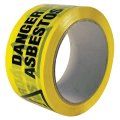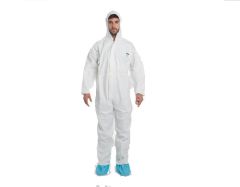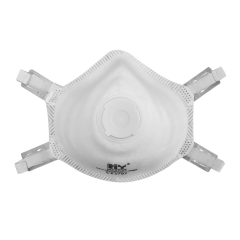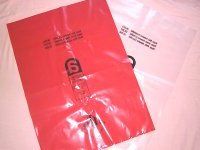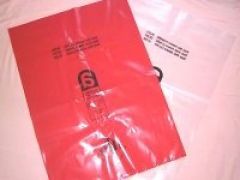Asbestos Bags (50 Pack)
50 Pack 30kg Heavy Duty Asbestos Bags 900mm x 1200mm. Council approved UN Certified UN 2212 2590 asbestos disposal bags available in required red & clear bag colours.
Asbestos Bags 50 pack Red / Clear
The correct way to bag asbestos waste is to carefully place all waste into the UN certified red asbestos bag being careful not to disperse fibres. This bag must be sealed and then placed within the clear asbestos bag along with any PPE that has been worn and again sealed.
Asbestos Removal Bags Description:
- Bag Dimensions: 900mm x 1200mm
- 30kg weight maximum (largest asbestos removal bags produced)(Heavy Duty)
- UN Certified 2212 2590
Available to purchase as:
Individual Asbestos Waste Bags (Red/Clear)£ 1.75
Packs 25 Asbestos Removal Bags (Red /Clear)£ 21.25
Packs 50 Asbestos Bags (Red/Clear or Mixed) £ 35
Pack 100 Asbestos Disposal Sacks Red/Clear or Mixed) £ 55
Christmas-New Year Dispatch Dates:
- 18th December midday cut off.
Any orders placed after this date will be processed.
- 27th December midday cut off.
- 30th December midday cut off.
- Next dispatch date: 2nd January 2024.
- Whilst standard delivery is stated as 1-3 days we are currently delivering over 99% of orders the next business day as a standard service if placed before 2.30 pm.
Delivery Options:
- Standard Delivery: (1-3 business days) (£ 5.75 - £ 6.20)
- Next Business Day Delivery: (Order Must be placed before 2 pm) (£ 9.50 ex vat)
- Next Day Working Day Delivery Pre 12 delivery (Order Must be placed before 2 pm): £ 11.50 ex vat
- Next Working Day Delivery Pre 10.30 delivery (Order Must be placed before 2 pm): £ 13.95 ex vat
- Weekend Delivery Options:
- Saturday Delivery: (Order Must be placed before 12 pm) £ 22.50 ex vat
FREE DELIVERY OVER £ 75 NET
- The free delivery over £ 75 net is only available for UK mainland.
- Deliveries to Islands and highlands are a 2-3 day delivery option only & charged at £ 16 ex vat.
Frequently Asked Questions
01. What Gauge are the Asbestos Removal Bags?
Only poly sheeting is categorised in “Gauge” which must be over 1000g for the Asbestos Industry.
Asbestos disposal bags must be UN certified and are classified according to the weight the bags would hold. This ranges from 10Kg bags which are cheaper, 20KG bags up to the heaviest duty Asbestos Removal Bags at 30KG. It is important not to overfill to limit potential splitting & exposure of dangerous asbestos fibres. The Heavy-duty 30kg bags are recommended.
02. Are there different Asbestos Waste Bags available?
Asbestos waste bags are classified based on the weight of asbestos waste that they can carry. The cheapest bags can only carry 10kg & the heaviest duty bags 30kg. The bags are 900 x 1200 in size however the thickness is based on the weight they have been designed to carry. I.e 30Kg will be thicker than a 20kg and a 10kg bag.
Be careful what KG bag you are actually buying. Cheap asbestos disposal bags will likely be low KG bags.
It is advisable to use the heaviest duty 30kg asbestos removal bags as they are less likely to split from overloading and therefore less likely to expose dangerous asbestos fibres.
The Asbestos bags also come in 2 different colours Red & Clear Asbestos bags. The red bag is slightly smaller than the clear bag. All waste needs to be double-bagged. The waste is placed in the red bag and then this should be placed in the clear bag along with any PPE and salad with tape.
03. What bags should I use for Asbestos Waste?
Asbestos waste bags must have an asbestos UN number. Only UN 2212 2590 Certified bags are legislated for use in the UK with the full asbestos coding visible will ensure that all asbestos waste labelling requirements are legally adhered to. The Asbestos removal bags come as both red and clear waste bags, with the red bag slightly small than the clear bag. The asbestos waste needs to be placed in the red bag being careful not to damage or break up the asbestos & then sealed. Do not overfill the bag, leave enough space to be able to seal with tape. You will then need to place the red bag and your PPE into the clear bag and seal properly again
N.B Always wear the correct Asbestos PPE when handling asbestos, which includes Asbestos masks & asbestos Graded Coveralls.
04. How to properly dispose of Household Asbestos?
| Material | How to Contain The Asbestos Waste |
| Asbestos Waste- ie Asbestos Cement Garage Roof or shed | Double bag in red/clear UN Certified 900x1200 bags-Dampen down any cement to stop fibres spreading |
| Asbestos insulation-ie infill panels and partitions | Wet the insulation Double bag in red/clear UN Certified 900x1200 bags If insulation wrapped around pie dispose of whole pipe. |
| Asbestos Pipe-ie Cement | Seal broken ends Double bag small pieces or fragments, dampen |
| Drywall Panels – ie Cement | Double bag in UN certified 900x1200 30kg bags |
We found other products you might like!
Frequently Asked Questions
01. What Asbestos PPE should be worn when removing asbestos materials?
The correct Asbestos PPE should be worn when removing asbestos materials, this includes FFP3 Masks, Cat 3 Type 5/6 coveralls, Overboots, goggles & gloves. (Asbestos Kit)
Once the asbestos waste has been removed and at the end of the job, please ensure that all Asbestos PPE is removed and also placed with the certified asbestos bags to prevent the spread of asbestos fibres.
02. What Asbestos kit is required to safely remove asbestos?
It is important that the correct asbestos kit is worn when handling asbestos to ensure that there is no exposure to asbestos fibres.
1. FFP3 masks (Either disposable mask or reusable mask with a P3 (FFP3) filter
2. Cat 3 type 5/6 coveralls
3. Goggles
4. Gloves
5. Overboots
All asbestos PPE must be correctly disposed of double-bagged in the UN certified asbestos bags (Red into clear) & sealed.
03. What is the correct grade of coveralls needed for Asbestos removals?
Coveralls range from basic which stop your clothing from getting dirty to full anti biohazard coveralls used in the most dangerous of situations.
The correct protective grade for Asbestos coveralls is the Cat 3 Type 5/6 Coveralls. These are available in SMS material (Trilaminate fabric) which protect against fluid & particulate penetration as well as microporous which not also prevents liquid molecules from entering but allows water vapour to permeate outwards. Both the SMS & Microporous Cat 3 Type 5/6 coveralls vary in gram weight, the microporous coveralls tend to be harder wearing. Please be aware that cheap thin versions of either are commonplace which will easily split putting the wearer in danger.
Certification type 5: EN ISO 13982-1 :2004+A1 :2009 type 6 EN 13034:2005 +A1 : 2009
04. What asbestos equipment do I need to remove household asbestos?
To remove any household asbestos such as asbestos tiles, lagging or asbestos infill you must ensure that you have the proper asbestos equipment & asbestos protective clothing to ensure full safety. The proper asbestos kit to include Asbestos masks (FFP3 Grade) , Cat3 Type 5/ 6 Coveralls, Overboots, goggles & gloves must be worn as well as UN certified asbestos bags red & clear & tape for the asbestos waste.
| REQUIRED ASBESTOS EQUIPMENT FOR REMOVAL OF HOUSEHOLD ASBESTOS |
| ASBESTOS MASKS FFP3 GRADE |
| ASBESTOS COVERALLS CAT 3 TYPE 5/6 LEVEL PROTECTION |
| GOGGLES |
| GLOVES |
| OVERBOOTS |
| DAMP SPONGE |
05. How do I dispose of Household Asbestos Waste?
Asbestos is classified as a hazardous waste however can be taken to the council’s waste & recycling centres & certain councils provide a free collection service for asbestos sheets and bagged asbestos waste. Please ensure that the correct Asbestos PPE is worn & the correct Asbestos waste bags are used.
06. What is the correct grade of mask required for Asbestos?
All masks used for unlicenced Asbestos work must be FFP3 (P3) grade protection with an APF x20. These masks can be either FFP3 disposable masks or reusable masks with the correct P3 filter. Full face masks offer enhanced 40x APF protection.
07. What eye protection needs to be worn for asbestos removal?
Closed eyewear such as goggles should be worn rather than open safety spectacles. Full face masks provide full facial protection as well as enhanced protection against asbestos fibres.


